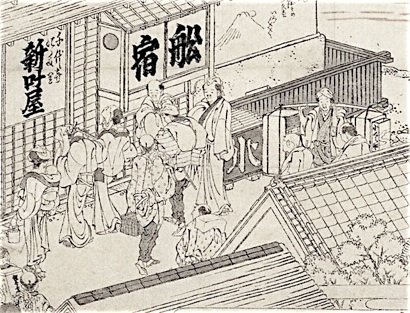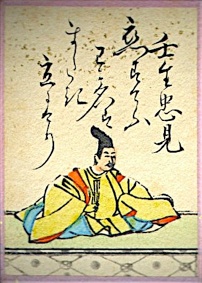壬生忠見


恋すてふ
我が名はまだき
立ちにけり
人知れずこそ
思ひそめしか
みぶのただみ
こいすちょう
わがなはまだき
たちにけり
ひとしれずこそ
おもいそめしか
Mibu no Tadami
My budding love
Is now talked about
Far and wide,
When I’d rather wish
People not to speak so.
Hokusai
Mibu no Tadami (dates unknown), was a middle Heian period waka poet and nobleman, and one of the Thirty-Six Immortal Poets. His father was Mibu no Tadamine (poem 30).
This was the poem that lost in a poetry contest against poem 40, but still gained equal praise. The legend that the poet died of grief after this event is not true, he continued writing poetry.
The above design for a woodcut for this poem was recently discovered and shows a for Hokusai contemporary busy street scene in Edo with a funeyado (sailors inn).
From Hokusai - One Hundred Poets: “The scene is a summer night in Edo in Hokusai’s time, specifically at Yanagibashi. This is the place next to Yanagi Bridge on the Sumida River from which boats departed regularly for the Yoshiwara entertainment district. One of the buildings at the center identifies it as a Fune yado (‘Boat Inn’). Other signs denote other businesses. The large character ‘Mizu’ on a closed container beside the street identifies it as ‘water’, used for fighting fires.”
The word omoi (‘think’ or ‘feel’) can refer to both shirezu (‘I thought no one knew’) and to someshi (‘I began to love’). While omoi-someshika (‘I thought I had just begun to love her’) could also be read as omoi-someshiga (‘how I wish I could start to love with no one knowing’).
Saying that he rather would not have people speak about it, could also imply that his feelings have just budded and/or that he prefers people not to know.


